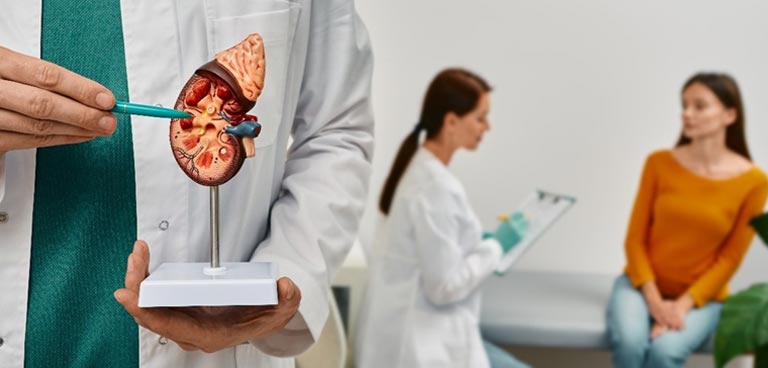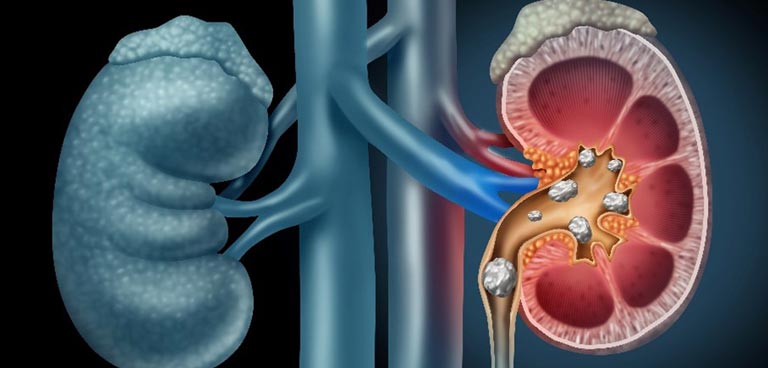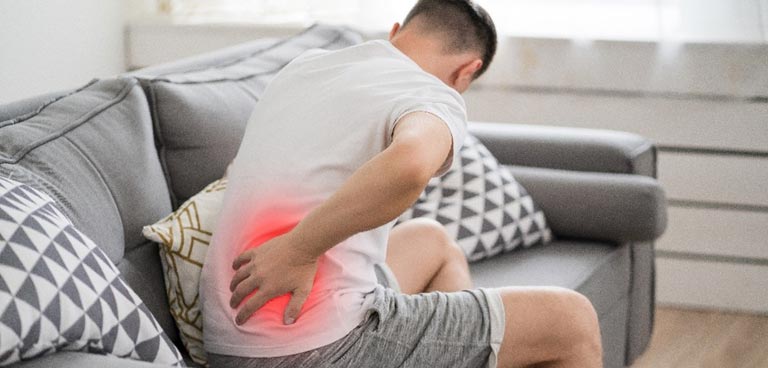Kidney stones are a common and painful medical condition that affects millions of people worldwide. These small, hard mineral and salt deposits can form in the kidneys and urinary tract, causing severe discomfort and potential complications. Read more to explore what kidney stones are, delve into their causes, symptoms, and complications, and most importantly, provide valuable insights into effective prevention strategies to maintain kidney health and lead a stone-free life.
What are Kidney Stones?
Kidney stones, also known as renal calculi, develop when certain substances in the urine, such as calcium, oxalate, and uric acid, become highly concentrated and form solid crystals. If the urine lacks enough fluids to dissolve these substances, they begin to clump together, gradually growing into kidney stones. Different types of kidney stones exist, each with distinct compositions, including calcium stones (the most prevalent type), uric acid stones, struvite stones, and cystine stones. Understanding the composition of kidney stones is vital for implementing effective prevention strategies.
Causes of Kidney Stones
To prevent kidney stones, it is essential to be aware of the factors that contribute to their formation:
- Inadequate Fluid Intake: Not drinking enough water reduces urine volume, leading to an increased concentration of stone-forming substances. Staying hydrated is crucial to maintain a healthy balance in the urinary system.
- Diet High in Sodium and Animal Protein: Diets rich in sodium and animal protein can raise the level of calcium and uric acid in the urine, making it more susceptible to stone formation. Reducing consumption of processed foods and moderating meat intake can help lower the risk.
- High Oxalate Intake: Oxalate is a naturally occurring substance found in certain foods, like spinach, nuts, and chocolate. Consuming excessive amounts of oxalate-rich foods can increase the risk of developing calcium oxalate stones. Balancing the diet and incorporating calcium alongside oxalate-rich foods can help prevent stone formation.
- Obesity and Weight Management: Obesity is associated with an increased risk of kidney stones. Maintaining a healthy weight through a balanced diet and regular exercise can significantly reduce the likelihood of stone formation.
- Family History and Genetics: A family history of kidney stones may increase an individual’s susceptibility to developing them. Knowing about any family history of kidney stones can help prompt preventive measures.
- Certain Medical Conditions: Conditions like urinary tract infections, gout, and certain metabolic disorders can raise the risk of kidney stone formation. Managing these conditions effectively with the help of healthcare professionals can aid in prevention.
Symptoms of Kidney Stones
Detecting kidney stones early is essential for timely treatment and prevention of complications. Common symptoms of kidney stones include:
- Intense and sudden pain in the back or side, which may radiate to the lower abdomen and groin.
- Hematuria (blood in the urine) or pink, red, or brown-colored urine.
- Frequent urge to urinate, often accompanied by a reduced volume of urine.
- Nausea and vomiting.
- Cloudy or foul-smelling urine.
It is crucial to seek medical attention if any of these symptoms are experienced, as kidney stones can lead to severe complications if left untreated.
Complications of Kidney Stones
When kidney stones are not promptly treated or managed, they can lead to various complications, such as:
- Obstruction of Urinary Flow: Larger stones can obstruct the flow of urine, leading to pain and potentially causing infections or kidney damage.
- Urinary Tract Infections (UTIs): Kidney stones can create a conducive environment for bacterial growth, increasing the risk of UTIs.
- Chronic Kidney Disease (CKD): Recurrent or untreated kidney stones can contribute to the development of chronic kidney disease, potentially leading to kidney failure.
- Sepsis: Severe infections resulting from untreated kidney stones can lead to sepsis, a life-threatening condition.

Preventive Strategies for Kidney Stones
Preventing kidney stones involves making necessary lifestyle changes and adopting healthy habits. Here are some effective strategies:
- Hydration is Key: Maintain adequate fluid intake to dilute the urine and reduce the risk of crystal formation. Drinking enough water, especially in hot weather or during physical activity, is crucial.
- Follow a Balanced Diet: Limit sodium, animal protein, and oxalate-rich foods in the diet. Instead, focus on consuming a variety of fruits, vegetables, whole grains, and lean proteins.
- Optimize Calcium Intake: Contrary to popular belief, including sufficient dietary calcium can bind to oxalate in the digestive tract, preventing its absorption and reducing the risk of calcium oxalate stones.
- Limit Sugar and Processed Foods: High sugar intake and processed foods can lead to obesity and increase the risk of kidney stones. Choose healthier snacks and meals to maintain a healthy weight.
- Moderate Alcohol and Caffeine Consumption: Excessive alcohol and caffeine intake can lead to dehydration, which contributes to stone formation. Moderation is key.
- Maintain a Healthy Weight: If overweight, work on gradually losing weight through a combination of a balanced diet and regular physical activity.
- Regular Exercise: Engage in regular exercise, as it can help maintain kidney health and reduce the risk of stone formation.
- Monitor Medical Conditions: If you have medical conditions such as urinary tract infections or gout, work with your healthcare provider to manage them effectively.
- Speak to a Healthcare Professional: If you have a family history of kidney stones or previous experiences with them, consult a healthcare professional to develop a personalized prevention plan.
Kidney stones are a prevalent condition that can cause immense pain and discomfort. However, by understanding the causes, symptoms, and complications of kidney stones, and adopting effective preventive strategies, you can significantly reduce the risk of developing them. Prioritize hydration, follow a balanced diet, maintain a healthy weight, and collaborate with healthcare professionals to safeguard your kidney health and enjoy a stone-free life. Remember, prevention is always better than cure, and taking proactive steps today can lead to a healthier tomorrow.
Concerned about kidney stones? Don’t hesitate to reach out to a kidney specialist at Southwest Kidney Institute (SKI) to understand your susceptibility to developing them and discover the most effective prevention strategies. Schedule an appointment with us today by visiting https://swkidney.com/contact-us/ or simply give us a call at 480.610.6100.


